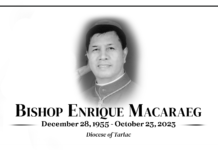DURING the feast day of St. Andrew the Apostle last November 30, the Vatican formally promulgated Pope Benedict XVI’s second encyclical, Spe Salvi. Although the official English title of the document is On Christian Hope, the original title is really a Latin expression meaning “saved by hope.” The encyclical takes its inspiration from the 24th verse of the eighth chapter of St. Paul’s Letter to the Romans: “For in hope we were saved.”
The promulgation was obviously timed with the Christmas season, which is called Advent in the Catholic calendar, the season of hope. And that hope is impelled by the birth of Jesus Christ, the source and engine of human redemption.
But alas, it seems man has no need for hope because he has no need for redemption. According to the Pope, in the contemporary world, religious faith has been replaced with faith in progress and technology, provoking a “crisis of Christian hope.” Science has become the golden calf: technology is expected to lessen human fragility, thus removing doubts about human superiority, so why should there be need for hope for salvation? In the same way, socio-political ideologies claim to be ultra-scientific, designing supposedly fail-safe social blueprints toward progress and prosperity.
Where is Christian hope in all of this?
In the same way that the Pope distinguished caritas (love) from eros (lust) in his first encyclical, Deus Caritas Est (God is Love), he now distinguishes between authentic hope and false hope. Faith in science is false, if not dangerous. Some have placed their hope in the mistaken belief that man could be redeemed through science — but science can destroy the world unless it is guided by religious values, Benedict writes. In the same vein, ideologies are mere utopias, neither here nor there, as powerfully symbolized by Samuel Butler’s Erewhon, a perfect society which is the inverse of “Nowhere.” Ideologies like Marxism tried to do without religion and create a perfect society through political structures, the Pope writes. Instead, this led to the “greatest forms of cruelty,” proving that “a world which has to create its own justice is a world without hope.”
No wonder, even if the secular world may have no need for Christian hope, the Holy Father, according to the Italian newspaper La Republica, seeks to enlighten Christians about God’s invitation for them to “have hope, without being thrashed by pessimism.” Therefore, science and utopian ideologies merely serve up false hope, which result in nihilism.
The Pope’s encyclical is a wake-up call for people to re-evaluate themselves and their relationship with the Almighty. In this case, Spe Salvi assumes the role of a beacon that seeks to restate the Church’s effort through the leadership of the Pope to refurbish our personal relationship with God through faith and hope. Experience shows, the Pope says, that anyone who does not know God “is ultimately without hope,” the great hope that sustains life.
The Pope provides “settings” to procure the proper disposition to learn and practice Christian hope. First is through a personal prayer. Through contemplative prayer, people become intimate and close to God, which in turn makes people capable of great hope. Second is action and suffering.
All serious and upright human conduct is hope in action, according to the document. By accepting our suffering and uniting it with the sufferings of Christ, we can become closer to Him.
Third is by having faith in the Last Judgment, which is a faith in the ultimate justice of the order of the world. According to the encyclical, God’s judgment is hope because it is both justice and grace.
And finally, the ultimate hope can be achieved by making the Virgin Mary our Stella Maris, or the sea star of hope, as we tread our journey of faith. The true stars of our life are the people who have lived good lives, such as the Virgin Mary and the saints.
We in the University of Santo Tomas have something to contribute to the discourse on hope that the Pope clearly articulates. As a higher institution of learning that is the oldest in Asia, we combine the optimism of the the sciences, natural and social, together with the optimism of authentic humanism, one that is firmly anchored on Christian salvation.
We reflect in our mission and commission the basis and trajectory of Christian hope–that we hope because salvation has been gratutiously endowed us by God, and that we carry out our lives in the light of the “trustworthy” hope that beckons us to a destiny that goes beyond science and social experiments. We give testimony to the wisdom of the Pope’s encyclical: We are truly a University of hope.














